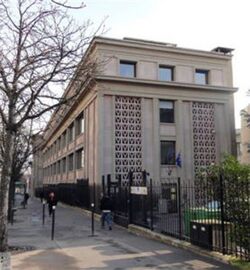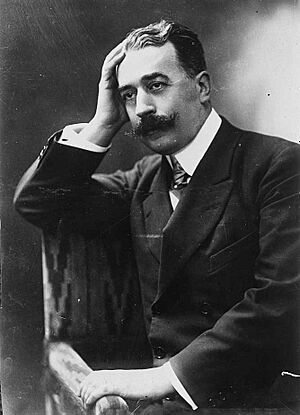International Chamber of Commerce facts for kids
 |
|

ICC headquarters in Paris, France
|
|
| Abbreviation | ICC |
|---|---|
| Nickname | The World Business Organization |
| Formation | 1919 |
| Founded at | Atlantic City |
| Type | NGO |
| Purpose | Enable business worldwide to secure peace, prosperity and opportunity for all. |
| Headquarters | Paris, France |
|
Region served
|
International |
|
Official language
|
English, French, Spanish |
|
Secretary General
|
John W.H. Denton AO |
| Affiliations | |
| Website | iccwbo.org |
The International Chamber of Commerce (ICC) is a huge group that helps businesses around the world. It is also known as "The World Business Organization." The ICC works with over 45 million businesses in more than 170 countries. These businesses are involved in almost every type of private industry.
The ICC helps businesses in three main ways:
- It creates rules for how businesses should act.
- It helps solve problems between businesses.
- It speaks up for businesses to governments and other big organizations.
Because its members are involved in international business, the ICC is very good at making rules for business across different countries. These rules are voluntary, but many businesses follow them every day. They have become an important part of how international trade works.
The ICC has offices and groups in over 90 countries. These groups help share business ideas at local and regional levels. More than 5,000 experts from ICC member companies share their knowledge. They help create the ICC's ideas on specific business topics.
The ICC is the only business group that can attend meetings at the United Nations General Assembly. It also speaks for businesses at the World Trade Organization and other international groups like the G20. The ICC was the first business group to get this special status with the United Nations.
Contents
- What is the ICC's History?
- How Can Businesses Join the ICC?
- How is the ICC Organized?
- How Does the ICC Help Solve Problems?
- How Does the ICC Create Policies and Business Rules?
- What is the World Chambers Federation?
- What Training and Events Does the ICC Offer?
- What Special Projects Does the ICC Have?
- See also
What is the ICC's History?
The International Chamber of Commerce started in 1919. Its goal was to help businesses worldwide. It wanted to make trade and investments easier. It also aimed for open markets for goods and services. Another goal was to allow money to move freely between countries.
The ICC's main office was set up in Paris. Its International Court of Arbitration started in 1923. The first leader of the ICC was Étienne Clémentel, a French Minister of Finance.
How Can Businesses Join the ICC?
Businesses can join the ICC in two ways. They can connect with an ICC national committee in their country. Or, they can apply directly to the ICC's main office in Paris.
How is the ICC Organized?
The ICC has several important groups that help it run smoothly.
What is the World Council?
The World Council is the ICC's highest decision-making body. It is made up of people from the national committees. This council chooses the ICC's top leaders. These leaders include the chair and vice-chairs. Each leader serves for three years. The chair, vice-chair, and the past chair (Honorary Chair) guide the organization.
What Does the Executive Board Do?
The Executive Board helps set the ICC's main goals. It has up to 30 business leaders. The World Council chooses these leaders. The board meets three times a year. It makes sure the ICC's plans are put into action.
What is the International Secretariat?
The ICC Global Headquarters is in Paris. This office is the main working part of the ICC. It creates and carries out the ICC's projects. It also shares business ideas with international organizations. The Secretary General leads the International Secretariat. The World Council appoints this leader.
What are National Committees?
In over 90 countries, members have created official ICC groups called national committees. If a country does not have a national committee, companies can still join. Other groups like chambers of commerce can also become direct members.
What Does the Finance Committee Do?
The Finance Committee gives advice to the Executive Board about money matters. It helps prepare the budget for the ICC. It also reports regularly to the board. This committee checks how ICC activities affect its money. It also watches the money coming in and going out.
How Does the ICC Help Solve Problems?
The ICC offers services to help solve problems in international business. ICC Arbitration is a private way to solve disagreements. It leads to a decision that everyone must follow.
The International Court of Arbitration of the ICC manages these arbitration cases. It has handled over 28,000 cases since it started in 1923. The court's work has grown a lot in the last ten years. To help with this, the ICC updated its digital platform in 2025. This platform helps with filing documents, paying fees, and managing cases online.
The court has members from 85 countries. It has representatives in North America, Latin America, Central America, Africa, the Middle East, and Asia. The ICC Court has also increased its training activities worldwide.
The ICC offers different ways to solve problems:
- Arbitration is a quick and effective way to solve disputes. It results in decisions that are final and can be enforced globally.
- Mediation is a private and secret process. A neutral person helps parties try to agree on a solution.
- Dispute boards are independent groups. They help solve disagreements that come up during a contract.
- Expertise helps find the right person. This person can give an independent opinion on any business topic.
- DOCDEX provides expert decisions for disputes. These are related to banking rules like documentary credits.
For smaller disputes (worth US$2 million or less), there are faster arbitration procedures. These apply if the agreement was made after March 1, 2017. As of 2024, 461 final decisions have been made using these faster procedures.
How Does the ICC Create Policies and Business Rules?
The ICC's policies, rules, and standards are created by special working groups. First, a policy idea must be approved by a commission. This is done with input from national committees. Then, the executive board must approve it. Only then does it become an official ICC position.
Commissions study important topics that affect businesses worldwide. Each national committee can send people to these meetings. Leaders are chosen by the chairman and Secretary General. Commission meetings usually happen twice a year.
Task forces are smaller groups within commissions. They work on specific projects for a limited time. They then report back to their main commission. Some task forces might include people from more than one commission.
What is the Code of Advertising and Marketing?
The ICC Code of Advertising and Marketing Communication Practice guides advertising and marketing globally. This Code sets ethical rules for businesses. It helps them use new technology and tools responsibly. Experts from different industries and regions created this code. Its goal is to protect consumers by setting rules for responsible marketing.
The Code has two main parts. The first part has general rules that apply to all marketing. The second part has detailed rules for specific areas. These include sales promotions, sponsorships, and digital media.
What is the World Chambers Federation?
In 1951, the ICC started the World Chambers Federation (WCF). It used to be called the International Bureau of Chambers of Commerce. The WCF is a unique global group that brings together chambers of commerce and industry worldwide. It aims to connect chambers and help them share good ideas. It also helps them create new global products and services. The WCF helps chambers work together with others to help local businesses grow. It is a non-political, non-government group. Its members include local, regional, and national chambers of commerce.
The WCF also organizes the World Chambers Congress every two years. This event happens in a different part of the world each time. It is the only international meeting for chamber leaders. They share ideas, learn about new business issues, and build connections.
During the Congress, the WCF also announces the winners of the World Chambers Competition. This is the only global awards program. It recognizes the most creative projects by chambers of commerce worldwide.
What Training and Events Does the ICC Offer?
The ICC holds events all over the world. These range from big conferences to small training sessions. The smaller courses teach about commercial arbitration and solving disputes. They also cover ICC trade tools like Incoterms rules and international contracts.
The ICC Academy is the ICC's training part. It offers online courses and certifications. These help banks, companies, and other groups learn about international trade. Experts from the ICC design these special programs and courses.
What Special Projects Does the ICC Have?
Business Action to Support the Information Society (BASIS)
The ICC started BASIS in 2006. This group speaks out on important topics. These include:
- How the internet is managed, including data protection and security.
- Making the telecoms market more open.
- Helping new businesses start.
- Encouraging new ideas and technology.
- Using technology to help development.
Commission on Anti-Corruption
The ICC has Rules of Conduct to fight corruption, extortion, and bribery. These rules help businesses have a strong program to ensure honesty.
The ICC's Commission on Anti-Corruption first published a guide in 1999. It was called "Fighting Corruption, A Corporate Practices Manual." This guide helps businesses follow the ICC Rules and other international agreements. The rules are voluntary and help businesses act honestly. The ICC wants these rules to be used as widely as possible.
How Does the ICC Work with the United Nations?
Since 1946, the ICC has had a special role with the United Nations. It works closely with many UN agencies. The ICC's representative to the UN is Crispin Conroy. In December 2016, the UN General Assembly gave the ICC Observer status. This means the ICC can attend and speak at UN General Assembly meetings. The ICC officially started this role on January 1, 2017.
See also
 In Spanish: Cámara de Comercio Internacional para niños
In Spanish: Cámara de Comercio Internacional para niños
- Incoterms
- Philippe Varin
- Zead Khalaf
 | William L. Dawson |
 | W. E. B. Du Bois |
 | Harry Belafonte |


